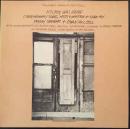Of all the trades in England the beggin' is the best
For when a beggar's tired he can lay him down and rest
And a-beggin' I will go
And a-beggin' I will go
I've a pocket for my oatmeal and another for my salt
I've a pair of little crutches that should see how I can bolt
And a-beggin' I will go
And a-beggin' I will go
There's patches on my fusty coat and a black patch on my eye
But when it comes to tuppenny ale I can see as well as thee
And a-beggin' I will go
And a-beggin' I will go
My britches they are no but holes but my heart is free of care
As long as I've my belly full my backside can go bare
And a-beggin' I will go
And a-beggin' I will go
I've been deaf at Duckinfield and I've been blind at Shaw
And many's the right and willing lass I've bedded in the straw
And a-beggin' I will go
And a-beggin' I will go
There's a bed for me where'er I lie and I don't pay no rent
I've got no noisy looms to mind and I am right content
And a-beggin' I will go
And a-beggin' I will go
I can rest when I am tired and I heed no master's bell
You men'd be daft to be a king when beggars live so well
And a-beggin' I will go
And a-beggin' I will go
Of all the trades in England the beggin' is the best
For when a beggar's tired he can lay him down and rest
For when a beggar's tired he can lay him down and rest
And a-beggin' I will go
And a-beggin' I will go
I've a pocket for my oatmeal and another for my salt
I've a pair of little crutches that should see how I can bolt
And a-beggin' I will go
And a-beggin' I will go
There's patches on my fusty coat and a black patch on my eye
But when it comes to tuppenny ale I can see as well as thee
And a-beggin' I will go
And a-beggin' I will go
My britches they are no but holes but my heart is free of care
As long as I've my belly full my backside can go bare
And a-beggin' I will go
And a-beggin' I will go
I've been deaf at Duckinfield and I've been blind at Shaw
And many's the right and willing lass I've bedded in the straw
And a-beggin' I will go
And a-beggin' I will go
There's a bed for me where'er I lie and I don't pay no rent
I've got no noisy looms to mind and I am right content
And a-beggin' I will go
And a-beggin' I will go
I can rest when I am tired and I heed no master's bell
You men'd be daft to be a king when beggars live so well
And a-beggin' I will go
And a-beggin' I will go
Of all the trades in England the beggin' is the best
For when a beggar's tired he can lay him down and rest
envoyé par Bernart Bartleby - 27/4/2015 - 08:43
Esistono molte varianti della canzone a testimonianza della sua vasta popolarità e diffusione. Una vecchia bothy ballad che affonda nella materia medievale dei canti dei vaganti, quel vasto sottobosco di umanità un po’ artistoide, un po’ disadattata, un po’ morta di fame che si arrabattava a sbarcare il lunario esercitando i mestieri più improbabili e spesso truffaldini.
Probabilmente già lo stesso Richard Brome si ispirò a questi canti dei mendicanti per la sua commedia “A Jovial Crew, or the Merry Beggars” (1640), in cui scrive il coro “The Beggar” detto anche The Jovial Beggar, con il refrain:
And a Begging we will go, we’ll go, we’ll go,
And a Begging we will go.
Come sia la melodia raggiunge una notevole popolarità moltiplicandosi in tutta una serie di “clonazioni” A bowling we will go, A fishing we will go, A hawking we will go, and A hunting we will go e così via.
Terre celtiche
Probabilmente già lo stesso Richard Brome si ispirò a questi canti dei mendicanti per la sua commedia “A Jovial Crew, or the Merry Beggars” (1640), in cui scrive il coro “The Beggar” detto anche The Jovial Beggar, con il refrain:
And a Begging we will go, we’ll go, we’ll go,
And a Begging we will go.
Come sia la melodia raggiunge una notevole popolarità moltiplicandosi in tutta una serie di “clonazioni” A bowling we will go, A fishing we will go, A hawking we will go, and A hunting we will go e così via.
Terre celtiche
Cattia Salto - 24/3/2018 - 23:35
Langue: italien
AND A-BEGGING I WILL GO nella versione di Martin Carthy
segue grossomodo il testo riportato in “Folk Songs of Lancashire” (Harding 1980).
La protesta contro il “sistema” all’insegna del sex-drinks&piping s’incanala in uno specifico filone di canti popolari (britannici e irlandesi) sul mestiere di mendicante, uno spirito libero che vagabonda per il paese senza radici e vuole solo essere lasciato in pace.
segue grossomodo il testo riportato in “Folk Songs of Lancashire” (Harding 1980).
La protesta contro il “sistema” all’insegna del sex-drinks&piping s’incanala in uno specifico filone di canti popolari (britannici e irlandesi) sul mestiere di mendicante, uno spirito libero che vagabonda per il paese senza radici e vuole solo essere lasciato in pace.
E A MENDICARE ANDRO'
Di tutti i mestieri in Inghilterra il mendicante è il migliore
perchè quando un mendicante è stanco si può fermare e riposare
A mendicare andrò,
a mendicare andrò
Ho una tasca per la farina d’avena e un'altra per il sale
ho un paio di stampelle dovreste vedere come riesco a scappare!
A mendicare andrò,
a mendicare andrò
Ci sono toppe sul mio cappotto malandato e una toppa nera sul mio occhio
ma quando si tratta di birra da due penny (1), riesco a vedere bene quanto voi
A mendicare andrò,
a mendicare andrò
I miei pantalono non hanno che buchi ma il mio cuore è libero dall’affanno
finchè ho la pancia piena il mio fondoschiena può andare nudo
A mendicare andrò,
a mendicare andrò
Sono stato sordo a Duckinfield e sono stato cieco a Shaw
e più di una ragazza ben disposta ho portato a letto nella paglia
A mendicare andrò,
a mendicare andrò
C’è un letto per me ovunque mi trovi e non pago l’affitto
non ho pensieri fastidiosi in testa e sono proprio contento
A mendicare andrò,
a mendicare andrò
Mi riposo quando sono stanco e non ascolto la campana del padrone (2)
è da pazzi voler essere un re quando i mendicanti vivono così bene!
A mendicare andrò,
a mendicare andrò
Di tutti i mestieri in Inghilterra il mendicante è il migliore
perchè quando un mendicante è stanco si può fermare e riposare
Di tutti i mestieri in Inghilterra il mendicante è il migliore
perchè quando un mendicante è stanco si può fermare e riposare
A mendicare andrò,
a mendicare andrò
Ho una tasca per la farina d’avena e un'altra per il sale
ho un paio di stampelle dovreste vedere come riesco a scappare!
A mendicare andrò,
a mendicare andrò
Ci sono toppe sul mio cappotto malandato e una toppa nera sul mio occhio
ma quando si tratta di birra da due penny (1), riesco a vedere bene quanto voi
A mendicare andrò,
a mendicare andrò
I miei pantalono non hanno che buchi ma il mio cuore è libero dall’affanno
finchè ho la pancia piena il mio fondoschiena può andare nudo
A mendicare andrò,
a mendicare andrò
Sono stato sordo a Duckinfield e sono stato cieco a Shaw
e più di una ragazza ben disposta ho portato a letto nella paglia
A mendicare andrò,
a mendicare andrò
C’è un letto per me ovunque mi trovi e non pago l’affitto
non ho pensieri fastidiosi in testa e sono proprio contento
A mendicare andrò,
a mendicare andrò
Mi riposo quando sono stanco e non ascolto la campana del padrone (2)
è da pazzi voler essere un re quando i mendicanti vivono così bene!
A mendicare andrò,
a mendicare andrò
Di tutti i mestieri in Inghilterra il mendicante è il migliore
perchè quando un mendicante è stanco si può fermare e riposare
(1) tippeny ale è la birra a buon mercato bevuta normalmente dalla gente comune
(2) non ha un padrone o un principale da cui correre appena sente suonare il campanello/sirena
(2) non ha un padrone o un principale da cui correre appena sente suonare il campanello/sirena
envoyé par Cattia Salto - 24/3/2018 - 23:58
Langue: écossais
LA VERSIONE SCOZZESE: To the Begging I Will Go - Ossian
Esistono molte varianti della canzone a testimonianza della sua vasta popolarità e diffusione. Una vecchia bothy ballad che affonda nella materia medievale dei canti dei vaganti
Esistono molte varianti della canzone a testimonianza della sua vasta popolarità e diffusione. Una vecchia bothy ballad che affonda nella materia medievale dei canti dei vaganti
TO THE BEGGING I WILL GO
Of all the trades that I do ken,
sure, the begging is the best
for when a beggar's weary
he can aye sit down and rest.
Tae the beggin' I will go, will go,
tae the beggin' I will go.
And I'll gang tae the tailor
wi' a wab o' hoddin gray,
and gar him mak' a cloak for me
tae hap me night and day.
Tae the beggin' I will go, will go,
tae the beggin' I will go.
An' I'll gang tae the cobbler
and I'll gar him sort my shoon
an inch thick tae the boddams
and clodded weel aboun.
Tae the beggin' I will go, will go,
tae the beggin' I will go.
And I'll gang tae the tanner
and I'll gar him mak' a dish,
and it maun haud three ha'pens,
for it canna weel be less.
Tae the beggin' I will go, will go,
tae the beggin' I will go.
And when that I begin my trade,
sure, I'll let my beard grow strang,
nor pare my nails this year or day
for beggars wear them lang.
Tae the beggin' I will go, will go,
tae the beggin' I will go.
And I will seek my lodging
before that it grows dark
when each gude man is getting hame,
and new hame frae his work.
Tae the beggin' I will go, will go,
tae the beggin' I will go.
And if begging be as good as trade,
and as I hope it may,
it's time that I was oot o' here
an' haudin' doon the brae.
Tae the beggin' I will go, will go,
tae the beggin' I will go.
Of all the trades that I do ken,
sure, the begging is the best
for when a beggar's weary
he can aye sit down and rest.
Tae the beggin' I will go, will go,
tae the beggin' I will go.
Of all the trades that I do ken,
sure, the begging is the best
for when a beggar's weary
he can aye sit down and rest.
Tae the beggin' I will go, will go,
tae the beggin' I will go.
And I'll gang tae the tailor
wi' a wab o' hoddin gray,
and gar him mak' a cloak for me
tae hap me night and day.
Tae the beggin' I will go, will go,
tae the beggin' I will go.
An' I'll gang tae the cobbler
and I'll gar him sort my shoon
an inch thick tae the boddams
and clodded weel aboun.
Tae the beggin' I will go, will go,
tae the beggin' I will go.
And I'll gang tae the tanner
and I'll gar him mak' a dish,
and it maun haud three ha'pens,
for it canna weel be less.
Tae the beggin' I will go, will go,
tae the beggin' I will go.
And when that I begin my trade,
sure, I'll let my beard grow strang,
nor pare my nails this year or day
for beggars wear them lang.
Tae the beggin' I will go, will go,
tae the beggin' I will go.
And I will seek my lodging
before that it grows dark
when each gude man is getting hame,
and new hame frae his work.
Tae the beggin' I will go, will go,
tae the beggin' I will go.
And if begging be as good as trade,
and as I hope it may,
it's time that I was oot o' here
an' haudin' doon the brae.
Tae the beggin' I will go, will go,
tae the beggin' I will go.
Of all the trades that I do ken,
sure, the begging is the best
for when a beggar's weary
he can aye sit down and rest.
Tae the beggin' I will go, will go,
tae the beggin' I will go.
envoyé par Cattia Salto - 25/3/2018 - 00:19
Langue: italien
La traduzione della versione scozzese (Ossian)l'ho fatta un più a senso che letterale
A MENDICARE
Di tutti i mestieri che conosco,
di sicuro il mendicante è il migliore
perchè quando un mendicante è stanco
si può fermare e riposare
A mendicare andrò, andrò,
a mendicare andrò
E andrò dal sarto
con una pezza di ruvida lana grigia
e gli chiederò di farmi un mantello
per ricoprirmi di notte e giorno.
A mendicare andrò, andrò,
a mendicare andrò
Andrò dal calzolaio
e gli chiederò di risuolare le mie scarpe
con del cuoio spesso
per camminare bene sulle zolle.
A mendicare andrò, andrò,
a mendicare andrò
E andrò dal tornitore
e gli chiederò di farmi una scodella
che possa contenere tre mezze pinte
perchè non si può fare con meno.
A mendicare andrò, andrò,
a mendicare andrò
E quando poi inizierò il mio mestiere,
di sicuro mi lascerò crescere la barba
nè mi taglierò le unghie quest'anno o oggi,
perchè i mendicanti le portano lunghe.
A mendicare andrò, andrò, a mendicare andrò
E mi cercerò un riparo
prima che cali la sera
quando ogni brav'uomo è rientrato a casa,
di nuovo a casa dal lavoro.
A mendicare andrò, andrò,
a mendicare andrò
E se il mendicare sarà un buon affare,
come spero lo sia,
è tempo che io vada via da qui
e m'incammini per la collina.
A mendicare andrò, andrò,
a mendicare andrò
Di tutti i mestieri che conosco,
di sicuro il mendicante è il migliore
perchè quando un mendicante è stanco
si può fermare e riposare
A mendicare andrò, andrò,
a mendicare andrò
E andrò dal sarto
con una pezza di ruvida lana grigia
e gli chiederò di farmi un mantello
per ricoprirmi di notte e giorno.
A mendicare andrò, andrò,
a mendicare andrò
Andrò dal calzolaio
e gli chiederò di risuolare le mie scarpe
con del cuoio spesso
per camminare bene sulle zolle.
A mendicare andrò, andrò,
a mendicare andrò
E andrò dal tornitore
e gli chiederò di farmi una scodella
che possa contenere tre mezze pinte
perchè non si può fare con meno.
A mendicare andrò, andrò,
a mendicare andrò
E quando poi inizierò il mio mestiere,
di sicuro mi lascerò crescere la barba
nè mi taglierò le unghie quest'anno o oggi,
perchè i mendicanti le portano lunghe.
A mendicare andrò, andrò, a mendicare andrò
E mi cercerò un riparo
prima che cali la sera
quando ogni brav'uomo è rientrato a casa,
di nuovo a casa dal lavoro.
A mendicare andrò, andrò,
a mendicare andrò
E se il mendicare sarà un buon affare,
come spero lo sia,
è tempo che io vada via da qui
e m'incammini per la collina.
A mendicare andrò, andrò,
a mendicare andrò
envoyé par Cattia Salto - 25/3/2018 - 00:30
In Bretagna, è stato Patrick Ewen a registrarla tra il Novembre e il Dicembre del 1973 proponendola nell'Lp omonimo presso l'eroica Cooperativa di Espressione Popolare NEVENOE' (della quale faceva parte anche la mia carissima, compianta amica Kristen Nogues). La versione fu appresa da Patrick Heslip, folk singer scozzese che a sua volta la imparò dal proprio nonno. Il testo ricalca abbastanza quello proposto da Martin Carthy con però alcune varianti, inoltre le strofe recano un ordine differente e due sono omesse. Da notare anche che la prima strofa inizia con Scotland al posto di England e nell'ultima il luogo viene sostituito con "O' a' the trades a man can try the beggin' is the best"
Flavio Poltronieri - 25/3/2018 - 08:46
×
![]()








Una ballata che deriva probabilmente dal The Beggars Chorus de “A Jovial Crew, or the Merry Beggars”, una commedia scritta dal drammaturgo inglese Richard Brome intorno al 1640.
Nella sua carriera Martin Carthy ne ha offerto più versioni, tutte riconducibili al testo accolto nella raccolta “Vagabond Songs and Ballads of Scotland” a cura di Robert Ford (Londra, 1899), dove però la paternità è attribuita al poeta scozzese settecentesco Alexander Ross.
Nel disco d’esordio, eponimo, di Martin Carthy del 1965.
Martin Carthy s’ispirò ad una precedente versione di Ewan MacColl (che incise la canzone nel suo disco del 1966 “The Manchester Angel”, con Peggy Seeger) che però non sono riuscito ad identificare con certezza tra le tante presenti in Rete. Contribuisco quindi qui innanzitutto il testo adottato da Carthy nel 1965, così come riportato su Mainly Norfolk: English Folk and Other Good Music